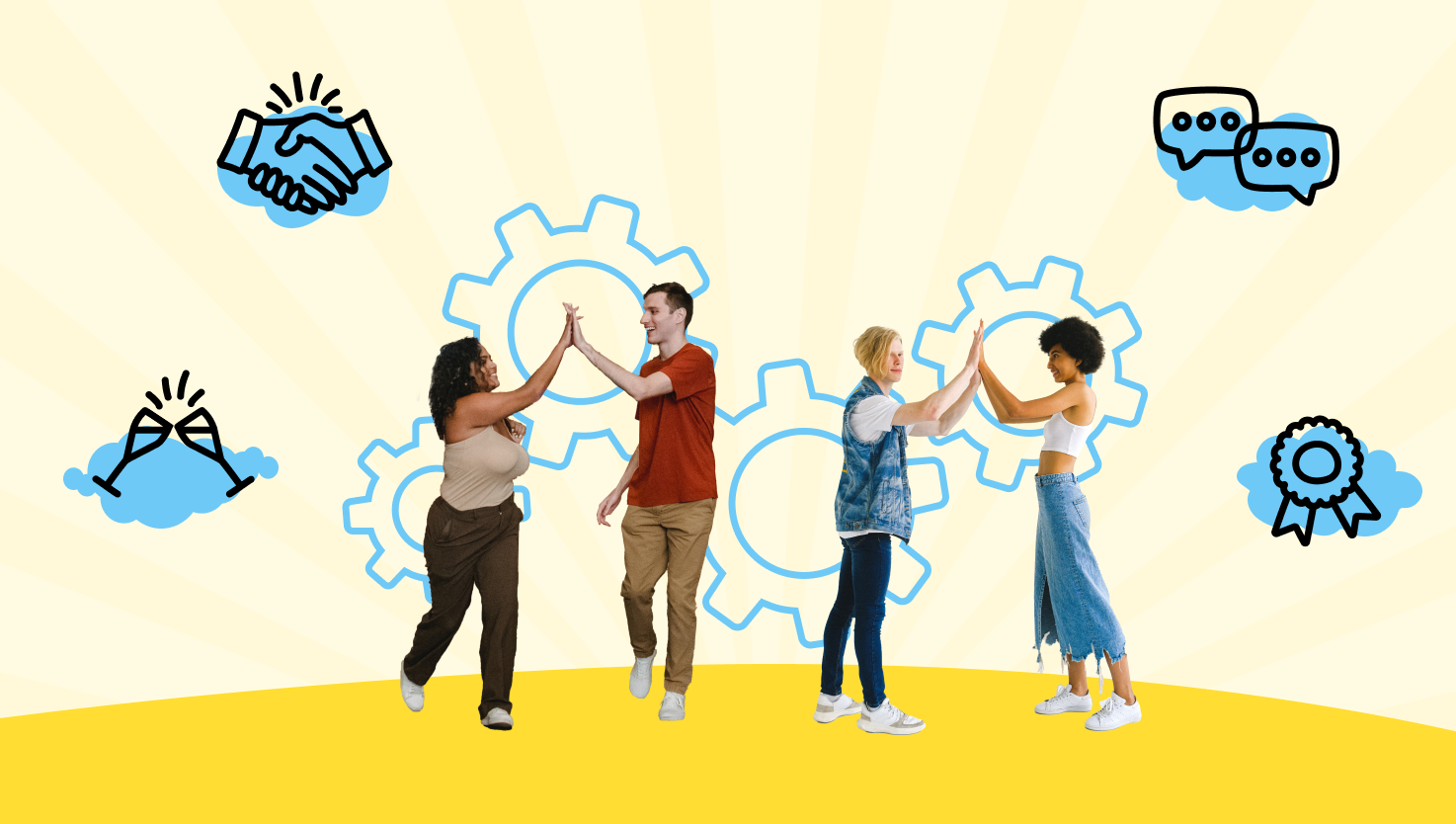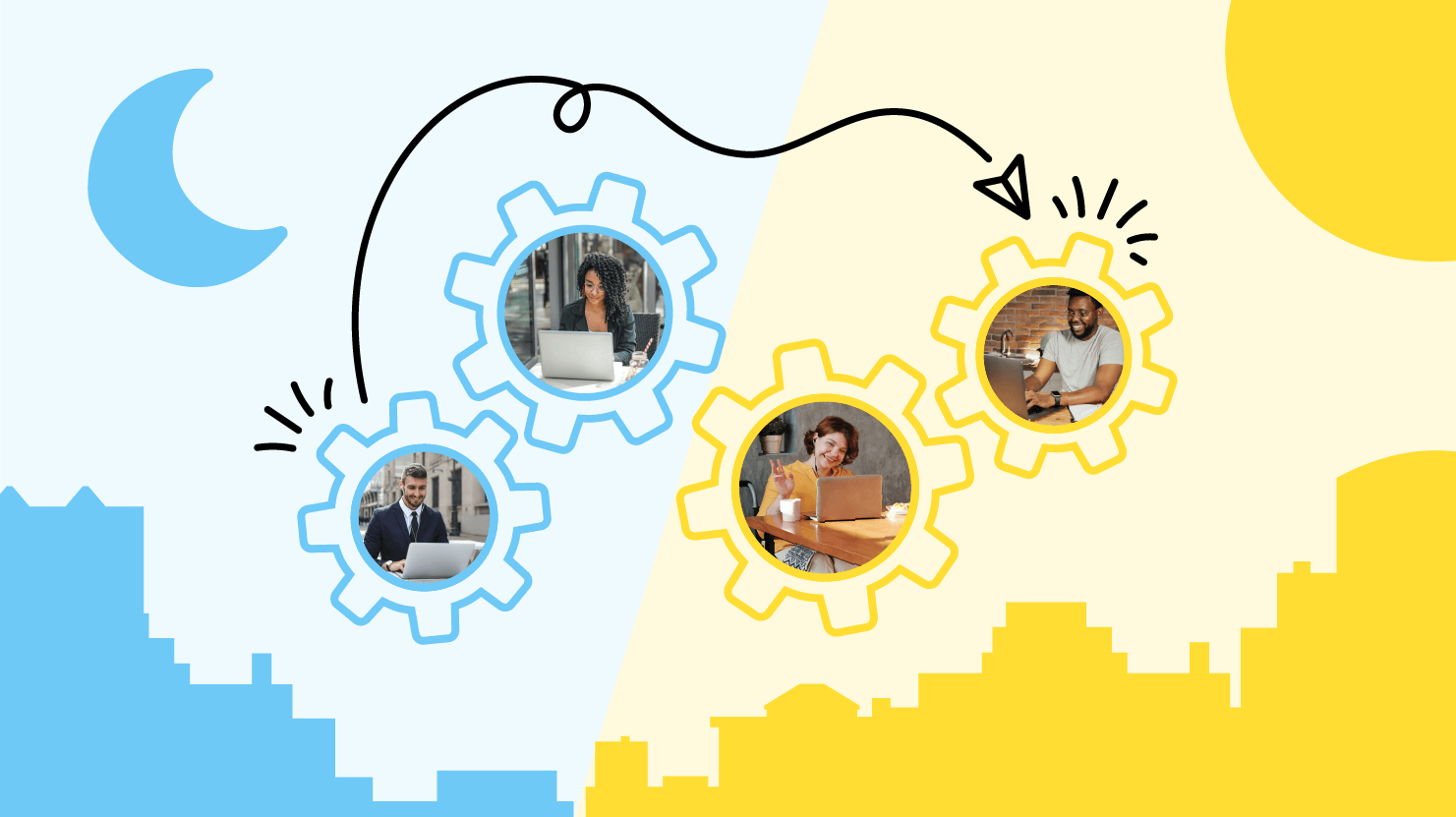
7 min read
Teamwork makes the dream work, but how does it happen? Explore the most common barriers to effective teamwork as well as strategies for building one.
By Jostle
Have you ever been part of a team that simply just didn't work, as if everyone was speaking different languages and no one was on the same page? Everyone seems to be talking about the same thing, but nothing seems to get done.
Teamwork, as simple as it may sound, is not easy to achieve. It refers to a group of people – in this case, employees – working together to complete a task or attain a common goal.
It’s not enough to expect everyone to work independently and magically come together in the end. Effective teamwork takes a conscious effort from all members and requires a coordinated strategy to make it work.
But a high-performance team doesn't only mean increased collaboration and productivity. Making it a part of your company culture also encourages a sense of accountability, respect, and trust within the organization.

Before we get into the strategies for promoting effective teamwork, let's take a look at some of the key characteristics that make up a successful team.
Bringing together a group of people with different skills and perspectives to work as a team can be challenging but can also be incredibly beneficial.
Without teamwork, tasks can take longer to complete, and goals may be harder to reach. But working as a team helps break down big tasks into smaller, more manageable tasks that can spread the workload more evenly.
Effective teamwork also encourages creativity and innovation as colleagues share ideas with each other to come up with solutions for difficult tasks or problems. It doesn’t only foster collaboration but also increases the morale of the entire team, as members feel more connected and appreciated for their contributions.
When teams work well, the benefits are obvious: increased productivity, reduced workloads, enhanced creativity, improved problem-solving, better morale, and higher employee satisfaction.
But what if certain issues just seem to stand between your team and success? What if certain barriers prevent your team from achieving its full potential?

Effective teams start with a culture of shared values, a clear mission, and open communication. But even when you have these elements right off the bat, a simple conflict or difficulty can quickly cause the team to fall apart.

While it’s straightforward to set up a team, even from the most diverse group of people, it’s far more difficult to build and maintain a team that works together as effectively as possible.
Effective teamwork doesn’t just happen on its own. It requires a certain level of skill, dedication, commitment, and effort to spark collaboration and connection among the team members.
Let’s take a look at some strategies you can use to promote effective teamwork in your organization.
Establishing team goals and objectives from the get-go sets the tone, direction, and expectations for the team. It is one of the best ways to start off on the right foot and guide the team on the right path as you work towards your desired outcomes.
When there's a complete understanding of what the team is trying to accomplish, everything else falls into place, and the team is able to move forward in a unified manner, regardless of potential obstacles.
Schedule a team meeting to discuss your goals and objectives, assign roles and responsibilities, and clarify expectations and timelines. Crafting a detailed plan of action with specific steps and tasks that everyone needs to take can keep things organized and smooth.
Nothing can bring a team down faster than poor communication. When team members are hesitant to express their opinions or ask questions, it stalls the team’s progress and creates an environment of mistrust.
Creating a safe and trusting environment through open communication allows a free exchange of ideas, constructive criticism, and honest feedback. It can lead to more creative solutions and better decision-making as a team while having the opportunity to unpack certain issues or conflicts that might otherwise remain unresolved.
Give everyone a platform to speak up and be heard. Facilitate conversations in meetings, establish channels for communication such as Slack or email, and take the time to listen to each other’s perspectives. Make sure that all ideas are taken into consideration when making decisions or exploring new options.
Keeping the team motivated and productive doesn't only mean recognizing their efforts, but also giving them the freedom to explore their potential and enabling them to do their best work.
From the necessary tools, software, and training to support and guidance from mentors, providing access to these resources allow the team to complete their tasks on time and at the highest quality possible.
Make everyday tools and processes available, offer specialized training and workshops, and provide feedback and mentorship opportunities to remove any barriers that might prevent them from achieving more than what was expected of them.
Rarely do teams come together and immediately start working in complete harmony. In fact, it can take quite some time for teams to find their rhythm as bumps and hiccups are expected along the way.
Team-building activities are one of the best ways to bring everyone together and break the ice in order to develop trust, respect, and understanding between team members. These activities can help the team identify strengths, weaknesses, and opportunities for growth, which can come in handy when tackling complex projects.
Host a simple team lunch, after-work drinks, or even more structured activities like outdoor games to virtual video challenges to encourage communication, build a stronger bond among the members, and bring the team closer together.
Every little thing that happens in the workplace can either boost or weaken employee morale and motivation. A positive team culture is the foundation of effective teamwork, and without it, the team won’t really last long.
When everyone feels respected, appreciated, and valued, regardless of their individual differences, trust among the members increases, and overall productivity follows suit. It's not every day that you find a group of people who are willing to work together as one, but when it happens, it's truly magical.
Take the time to get to know each other in the team better and create an environment where everyone can feel comfortable speaking up and expressing their thoughts, ideas, and opinions while having the opportunity to learn new things along the way.
Building a successful and effective team doesn't happen overnight. It requires consistent effort, ongoing evaluation, and a never-ending commitment from everyone involved, regardless of their position in the organization.
By investing in strategies that promote effective teamwork, organizations can create teams that are far greater than the sum of their parts while harnessing the collective power of successful individuals who are motivated and ready to take on the world.
It may take some trial and error, but in the end, you’ll have a highly effective team that seamlessly works together to achieve remarkable results.
Read more by
Jostle
Jostle’s employee success platform is where everyone connects, communicates, and celebrates at work. Find out more at jostle.me. © 2009–2024 Jostle Corporation. All rights reserved.